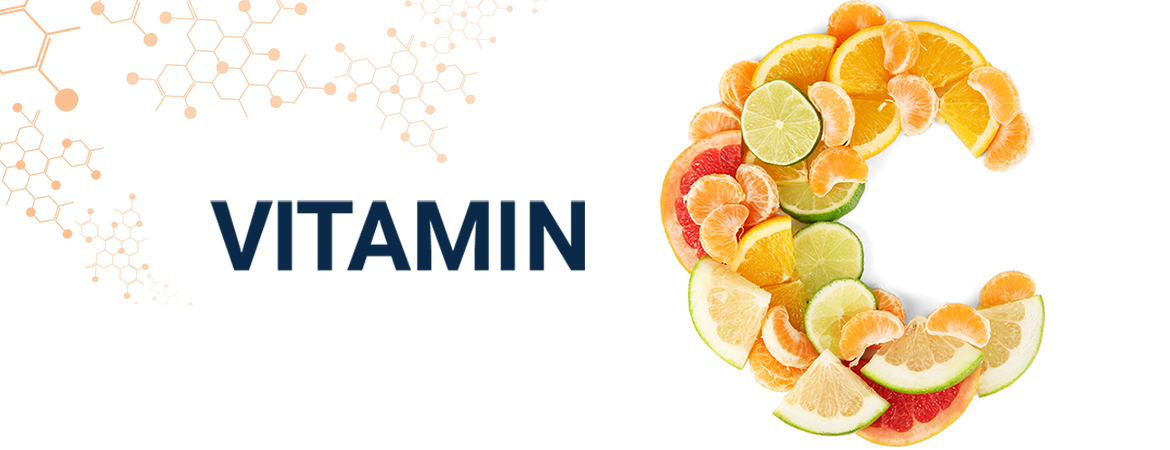Vitamin C - Strengthens the immune system in 20 different ways
Scientific Data on Biochemical Action
Vitamin C, also known as ascorbic acid, is a water-soluble vitamin essential for the normal growth and repair of connective tissue, namely, bone, cartilage, blood vessels and skin.
It is a key for a strong and well-functioning immune.
Here's how:
- Vitamin C supports the production of interferons.
Interferons are produced when the presence of pathogens is detected.
They facilitate the ability of cells to initiate protective cellular defenses.
- Vitamin C enhances the function of phagocytes.
Phagocytes are a kind of white blood cell that surrounds pathogens and other dangerous particles. Once the intruders are captured, they are digested and neutralized enzymatically.
- Vitamin C is mainly found in white blood cells.
Some of these primary cells of the immune system have levels of vitamin C up to 80 times higher than the levels found in the plasma.
- Vitamin C supports the cellular immune response.
There are 2 main ways that the body can respond to a pathogen: antibody immunity and cellular immunity. The cell-mediated response refers to the activation of macrophages, natural killer cells, and antigen-specific T-lymphocytes that attack anything that is perceived as a foreign agent.
- Vitamin C enhances cytokine production by white blood cells.
Cytokines are communication proteins released from certain white blood cells and transmit information to other cells, thus promoting the immune response.
- Vitamin C inhibits the apoptosis of various forms of T-lymphocytes.
T-lymphocytes are a type of white blood cell. They are an integral part of the cell-mediated immune defense system. Vitamin C helps to keep these important cells alive and viable.
- Vitamin C enhances the production of nitrogen oxide by phagocytes.
Nitrogen oxide is produced in massive quantities in these cells, and is one of the factors that will kill captured pathogens.
- Vitamin C enhances the production of T-lymphocytes.
These cells are essential for cell-mediated immune responses, and vitamin C helps to multiply in number.
- Vitamin C increases the production of B lymphocytes.
These white blood cells produce the antibodies as part of the antibody-mediated immune response. These antibodies are formed in response to the initial introduction of an invading pathogen or antigen.
- Vitamin C inhibits the production of neuraminidase.
Some pathogenic viruses and bacteria create neuraminidase, an enzyme that keeps them from being trapped in the mucus, one of the natural lines of body defense. By inhibiting neuraminidase, vitamin C helps to optimize this defense mechanism of the body.
- Vitamin C supports the production and activity of antibodies.
Good antibody function is important for a healthy immune system.
- Vitamin C supports the activity of natural killer cells.
Natural killer cells are small lymphocytes that can attack directly cells, such as cancer cells, and kill them
- Vitamin C favors the formation of prostaglandins.
Prostaglandins are hormones - compounds that control a variety of physiological processes, including regulation of T-cell function.
- Vitamin C supports circular GMP levels in lymphocytes.
Circular GMP plays a leading role in regulating various physiological responses, including immune responses. Circular GMP is important for normal reproduction and differentiation (specificity for specific purposes) of cells. Circular GMP also controls the action of many hormones, and appears to mediate relaxation of smooth muscle.
- Vitamin C supports localized production and / or interaction with hydrogen peroxide.
Vitamin C and hydrogen peroxide can kill microorganisms and can dissolve the protective granules of certain bacteria, such as pneumococci.
- A lesser known property of vitamin C is that it inhibits histamine.
This effect of vitamin C is important for supporting the immune to local factors.
- Vitamin C neutralizes oxidative stress.
- Vitamin C improves and enhances the immune response achieved by vaccination.
- Vitamin C enhances the mucolytic effect.
This property helps to fluidize fatty secretions, increasing immune access to infection.
- Vitamin C can make bacterial membranes more permeable to some antibiotics.
Vitamin C is an ardent supporter of healthy immune function.
The immune system depends to a significant extent on the intake of nutrients!
Vitamin C is an antioxidant that helps prevent and treat the common cold.
Many infections lead to the activation of phagocytes, which in turn release oxidizing agents, also known as active forms of oxygen (ROS).
Vitamin C deficiency can lead to reduced resistance to certain pathogens, while a higher supply strengthens various parameters of the immune system.
♦ Regular administration of vitamin C has shortened the duration of the common cold! ♦
⇒ Vitamin C Fast Action is a fast-absorbing formula that contains the best forms of vitamin C (camu-camu & acerola) as well as piperine!
• Piperine effectively improves bioavailability in nutrients by increasing the absorption of many active and nutrients from the gastrointestinal tract by altering the potential of the membrane and increasing its permeability at the site of absorption.







